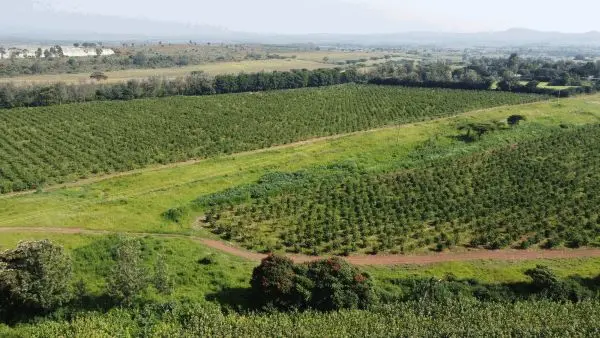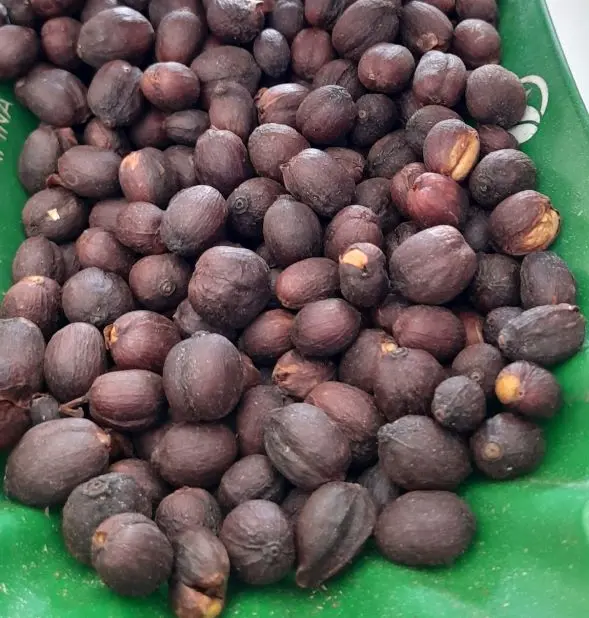Did you know Kenyan coffee beans are among the most prized in the world? Many coffee connoisseurs and casual drinkers agree that Kenyan coffee tastes good. And if you ask why, the answer is simple: the coffee stands out for its unique taste and distinctive aroma.
But what exactly makes Kenyan coffee beans so special? Is it the unique growing conditions, the meticulous processing methods, or something more? Let's dive into the 10 major facts that make Kenyan coffee beans a standout in the global coffee industry.
1. Unique Geographical Conditions for Coffee Cultivation
Kenya's location along the equator in East Africa provides an ideal climate for growing Arabica coffee. The country's high-altitude regions, such as the Mount Kenya area, the Aberdare Range, and the Great Rift Valley, offer perfect conditions for coffee cultivation.
These regions, located at altitudes ranging from 1,500 to 2,100 meters above sea level, provide the cool temperatures and high humidity needed for the slow ripening of coffee cherries, allowing for the development of complex flavors.
The volcanic soil in these areas is rich in nutrients, further contributing to the unique characteristics of Kenyan coffee. The combination of altitude, fertile soil, and equatorial sunlight gives the beans distinctive bright acidity and floral aromas that coffee enthusiasts cherish.

2. Strict Hard Bean (SHB) and High Grown (SHG) Status
Kenyan coffee often holds the Strict Hard Bean (SHB) and High Grown (SHG) status, indicators of quality and altitude. Grown between 1,400 and 2,000 meters above sea level, these beans mature slowly, absorbing more nutrients from the soil. This slow maturation process enhances the flavor profile, giving Kenyan coffee its distinctive bright acidity, fruity notes, and full body.
3. Unique Flavor Profile
Kenyan coffee is renowned for its flavor profile of bright acidity, often described as crisp, wine-like, and refreshing and fruity undertones, such as blackcurrant, berry, and citrus. This acidity, combined with a full body and complex taste, contributes to a vibrant and satisfying coffee experience, whether as a single-origin coffee or in blends.
Kenyan coffee tops the five best coffees in the world. The country's beans are known for their bright acidity, full-bodied richness, and distinctive fruity notes, which set them apart from other coffees.
4. Traditional Growing Methods and Harvesting Practices
Kenyan coffee farmers still use traditional growing methods, including hand-picking and natural drying processes. Hand-picking ensures that only the ripest cherries are selected, maintaining the integrity and quality of the beans.
Women are often preferred for coffee harvesting due to their attention to detail and care in picking the best cherries. After harvesting, the beans undergo a meticulous wet-processing method that preserves their flavor and quality.
5. The Double Fermentation Process
Kenyan coffee undergoes a unique double fermentation process, which sets it apart. After the beans are fermented and washed, they are soaked in fresh water for up to 24 hours and then fermented again to enhance the development of intricate flavors. This meticulous process amplifies the coffee's acidity and brings out bright, fruity notes characteristic of Kenyan coffee, making it a favorite among specialty coffee roasters and baristas.
6. Generic Variants of Kenyan Coffee
Did you know that Kenyan coffee comes in five different variants? The Arabica beans from Kenya, particularly the SL28 and SL34 varieties developed by Scott Agricultural Laboratories in the 1930s, are known for their resilience to drought and ability to produce coffee with outstanding cup qualities, including full body, bright acidity, and fruity notes.
- SL28 balances sweetness and acidity with blackcurrant, berry, and citrus flavors.
- SL34 offers a richer body with deeper flavors, including chocolate and spice undertones.
These varieties create a complex and memorable coffee with a wide range of flavor profiles, appealing to coffee lovers worldwide.
7. Unique Coffee Grading System that Ensures Quality
Kenya's coffee grading system is unique based on size, shape, and density. The top grades, AA and AB, are considered the highest quality due to their larger bean size and superior flavor. They often command a premium price in the global market. The grading system ensures that consumers receive the best coffee and rewards farmers for producing high-quality beans.
The eight coffee grades are:
- AA: Large beans (20 mm) with the highest quality.
- AB: A mix of A and B grades (6.80 mm).
- PB (Peaberry): Rare round beans, highly prized.
- E (Elephant): The largest beans.
- C: Smaller beans.
- T: Smallest, thinnest, often faulty.
- TT: Light beans, typically from "elephants."
- MH/ML: Unwashed beans (Mbuni) with lower prices and a sour taste.

8. The Rare Peaberry Beans
Peaberry beans are a rare mutation found in about 5-10% of coffee cherries, where only one small, round bean develops instead of the usual two. These unique beans are highly sought after for their distinctive flavor and are often separated and sold at a premium.
In Kenya, peaberry beans are known for their bright acidity, fruity notes, and full-bodied richness, enhancing the country's reputation for producing exceptional coffee.
Kenya is one of Africa's leading coffee producers and baristars and coffee roasters often blend Kenyan coffee with beans from other coffee-growing regions to create well-rounded flavor profiles.
9. Exceptional Aftertaste
Kenyan coffee's aftertaste is another reason it is so highly regarded. Unlike many coffees that leave a bitter or flat finish, Kenyan coffee has a clean, lingering aftertaste with hints of fruit, wine, and chocolate.
Brew a cup and experience the distinctive flavor without added sweeteners or flavors that could make you a die-hard black coffee drinker!
10. Commitment to Sustainable Practices
Kenyan coffee farmers are increasingly adopting sustainable farming practices to ensure the long-term viability of their coffee crops. Many farms employ organic farming methods, use natural fertilizers, and implement water conservation techniques.
Shade trees are also commonly used to maintain biodiversity and protect coffee plants from direct sunlight.
Kenyan kahawa gained prominence in the global market in the mid-20th century. Its distinctive flavor profile quickly caught the attention of coffee enthusiasts worldwide, establishing Kenya as a leading producer of specialty coffee.
Today, direct trade relationships are gaining popularity, with initiatives like Solai Coffee's farm-direct model ensuring more profits go back to the farmers, fostering sustainable relationships and a secure future for Kenyan coffee.
Next time you brew a cup, savor the unique qualities that make this coffee special.
FAQs
Kenyan coffee is known for its bright acidity, fruity notes, and full-bodied flavor, which come from unique growing conditions and meticulous processing methods.
In Kenya, Arabica coffee dominates the market, making up over 90% of the nation's coffee output.
The Five variants are SL series (SL 28, SL34), Ruiru 11, Batian, Blue Mountain and K7 each with distinctive flavor.
Yes, many Kenyan farmers use sustainable farming practices and participate in direct and fair trade models.
No, Peaberry is not a coffee variety but a bean type. Peaberry coffee beans are like the single child of the coffee cherry instead of two
Purchase from farm direct companies like solai coffee
Use Pour-Over, French Press, or AeroPress to highlight its natural acidity and complex flavors.
10 Major Facts About Kenyan Coffee Beans and Why They're So Special